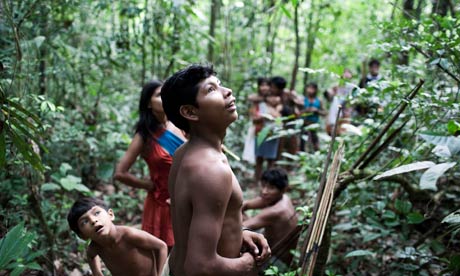Survival International, a leading advocate for tribal peoples' rights worldwide, said the small tribe's territory had been invaded by illegal loggers, ranchers and settlers, and the group is threatened with extinction. The aim of the campaign is to persuade Brazilian Justice Minister Jose Eduardo Cardozo to send in police to remove the loggers, ranchers and settlers and keep them out.
A short film by Survival International features an appeal by Firth to sign a petition calling on Mr Cardozo to act to save the tribe.
"The Awa's forest is being illegally cut for timber. When the loggers see them, they kill them. Their bows and arrows are no match for guns. And at any other time in history, that's where it would end. Another people wiped off the face of the Earth, forever," Firth says in his appeal. "But we're going to make sure the world doesn't let that happen."

We can save the Awá tribe
As the successful survival of other Amazon Indian tribes shows, protecting their way of life rather than imposing that of the west is the best way to keep them intact
By Stephen Corry
Although people have been saying it for generations, it isn't true: tribes are destroyed by labelling them backward, and pretending they stand to benefit from "civilisation". It's fundamentally racist, and the evidence points, glaringly, and to our shame, in exactly the opposite direction.
When land is taken, tribes simply don't survive. On the other hand, when it's protected, most of their problems evaporate. That can happen if no one else wants the land, it's inaccessible to outsiders or, most importantly, there's the political will and strength to ensure it remains with the Indians.
On their own territory, they can adapt to change as they wish. Some individuals might leave to explore the outside, but most will return home to its invaluable advantages: free food and housing, as opposed to scraping a living in shantytowns and slums, where life is usually nasty, brutish and short.
The "integration" of these peoples is the theft of their self-sufficiency, and their condemnation to the lowest rung of a steep and greasy ladder–or worse, death. However, we believe, profoundly, that there will still be Amazon Indians at the end of the century. It merely entails respecting the laws and rights which governments claim to uphold. Cynics might argue that it won't happen, that the fast buck will always triumph, but that's really an admittance that we are the savages, unfettered by any rule of law, common decency or humanity.
We have seen tribal peoples' lands protected repeatedly over the last 40 years. The largest little-contacted tribe in Amazonia, the Yanomami, survived because a 20-year campaign secured the protection of their lands in 1992. They remain steadfastly Yanomami.
The Awá will doubtless survive as well, but only if the campaign in defence of their land is similarly vociferous. In the words of Colin Firth, who is supporting our campaign: "One man can stop this: Brazil's minister of justice. He can send in the federal police to catch the loggers, and keep them out for good. But right now it's just not his priority.
"We have to change that before it's too late. We need enough people to message him that he takes notice… You, me, our friends, our families. Everyone counts. But we don't have much time. When the rains stop, the loggers will be back. This is our chance, right now, to actually do something. And if enough people show they care, it will work."

More background on the issue:
Group hopes to save world's 'most threatened' tribe in Brazil
Legal wrangling and deforestation projects leave the Awá tribe scrambling for safety.
By Stephanie Pappas
"When you talk to the Awá, it's just so clear how much the forest means to them," she said. "They just get everything from it."
That includes food—babaçu nuts and açaí berries as well as fresh meat—and medicines and supplies, such as the resin of the maçaranduba tree, which is used to make torches.
As the forest vanishes, the Awá are trapped in a legal battle to save it. In 2009, a federal judge ruled that illegal settlers had to leave the Awá territories within 180 days. A legal appeal by one of the largest cattle ranchers in the region delayed the ruling. In December 2011, a second federal judge ruled that colonists and ranchers had to leave the land by December 2012. Survival fears that continued legal wrangling will delay these departures, too. If the case continues in the legal system, it could take 20 or 30 years for the Brazilian Supreme Court to decide it. By that time, it will be too late for the Awá.
"Time is not on their side," Watson said.
For more on Amazon Indians, see Sunday Night Probed Over "Freakshow" and Ya'Wara in AQUAMAN.

No comments:
Post a Comment